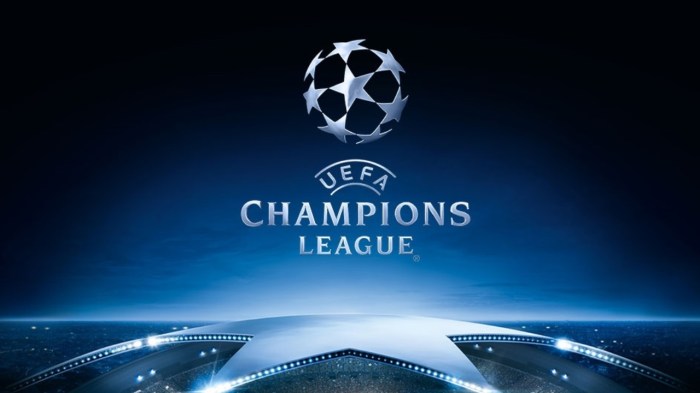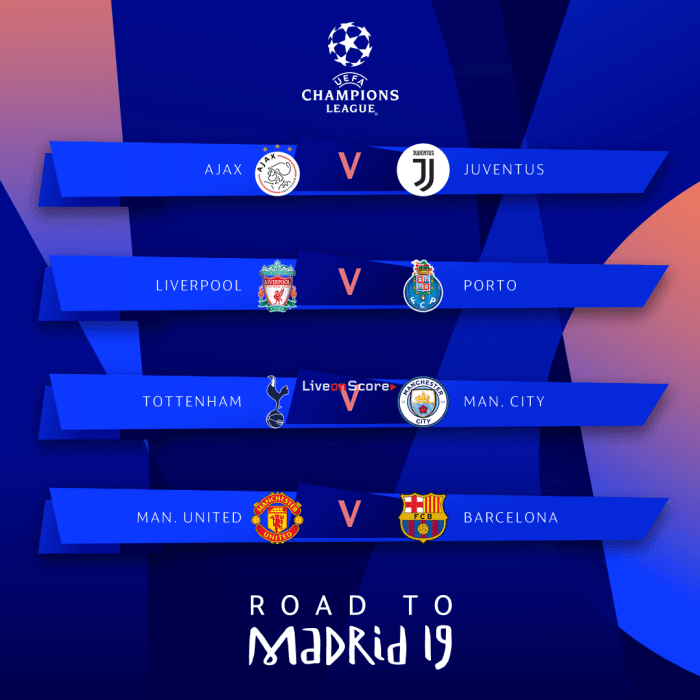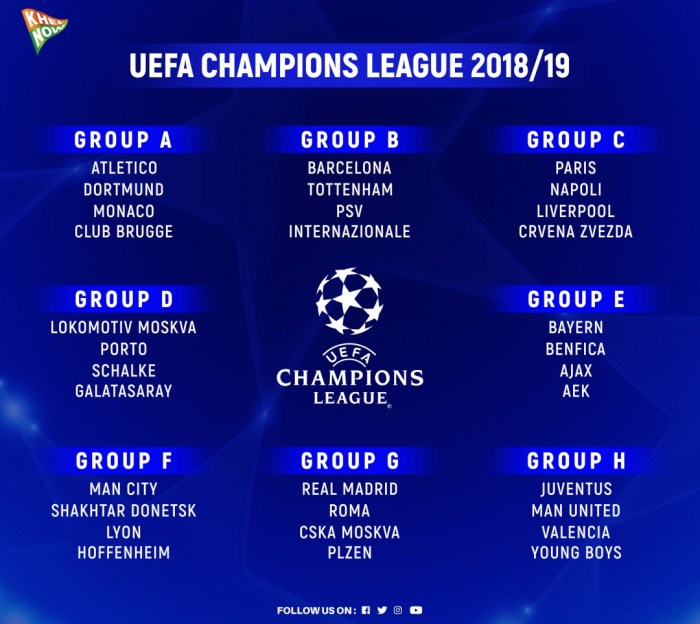UEFA Champions League games are the pinnacle of club football in Europe, a competition that draws in millions of fans worldwide. From the electrifying atmosphere of the group stages to the high-stakes drama of the knockout rounds, the Champions League showcases the best teams and players on the continent, battling for the coveted trophy that symbolizes continental supremacy.
This competition has evolved over the decades, with its format, rules, and participating teams constantly adapting to the changing landscape of European football. From its humble beginnings as the European Cup, the Champions League has become a global phenomenon, generating immense revenue and influencing the development of club football across the world.
The UEFA Champions League

The UEFA Champions League, formerly known as the European Cup, is the premier club football competition in Europe. It is considered the most prestigious club tournament in the world, attracting top teams and players from across the continent. The competition has evolved significantly over the years, becoming a global spectacle with a massive following.
History and Evolution
The UEFA Champions League traces its roots back to the European Cup, which was founded in 1955. The initial format involved a single-elimination tournament for the champions of each European country. In 1992, the European Cup was rebranded as the UEFA Champions League, introducing a group stage and a more comprehensive format.
This change expanded the competition to include more teams and created a more competitive environment. The UEFA Champions League has continued to evolve, with changes to the format, qualification rules, and prize money over the years.
Key Facts and Figures, Uefa champions league games
The UEFA Champions League features a complex format involving a group stage, knockout rounds, and a final. The competition features 32 teams from across Europe, with the number of teams from each country determined by their performance in previous seasons.
The group stage consists of eight groups of four teams, with the top two teams from each group advancing to the knockout rounds. The knockout rounds consist of a series of two-legged ties, with the winners progressing to the next round.
The final is a single-leg match played at a neutral venue.
- The UEFA Champions League is a lucrative competition, with the winning team receiving a significant prize money payout. In addition to prize money, the competition provides valuable exposure and branding opportunities for clubs.
- The competition has witnessed some of the most iconic moments in football history, including legendary players, unforgettable goals, and thrilling comebacks.
Prestige and Global Reach
The UEFA Champions League is widely regarded as the most prestigious club competition in the world. It attracts top players and teams from across Europe, making it a showcase of the highest level of football. The competition has a global reach, with millions of fans tuning in to watch matches.
The UEFA Champions League has a significant impact on club football, providing clubs with a platform to showcase their talents and compete for the ultimate prize. The competition also generates substantial revenue for clubs, which is reinvested in players, infrastructure, and youth development.
The Format and Structure of the Competition: Uefa Champions League Games
The UEFA Champions League is a complex and captivating tournament, with a structured format designed to showcase the best teams in Europe. It unfolds in stages, starting with qualifying rounds and culminating in a grand final. The competition’s format and rules are carefully crafted to ensure fairness, excitement, and ultimately, a deserving champion.
The Stages of the Competition
The UEFA Champions League unfolds in a series of distinct stages, each with its own set of rules and regulations.
- Qualifying Rounds:Teams from lower-ranked European nations compete in preliminary rounds to earn a place in the group stage. These rounds involve two-legged ties, with the aggregate score deciding the winner.
- Group Stage:Thirty-two teams are divided into eight groups of four. Each team plays the other teams in their group twice, once home and once away. The top two teams from each group advance to the knockout phase.
- Knockout Phase:The knockout phase consists of a series of two-legged ties, with the aggregate score deciding the winner. This phase begins with the Round of 16 and progresses through the Quarterfinals, Semifinals, and ultimately, the Final.
- Final:The UEFA Champions League final is a single-match event, played at a predetermined neutral venue. The two finalists compete for the coveted trophy, the symbol of European club football supremacy.
The Seeding System
The UEFA Champions League uses a seeding system to determine the composition of the groups and the pairings in the knockout phase.
- Group Stage Seeding:Teams are seeded based on their UEFA club coefficient, a ranking system that reflects their performance in previous European competitions. Teams with higher coefficients are placed in higher-seeded pots, ensuring a more balanced distribution of strength across the groups.
- Knockout Phase Seeding:The seeding for the knockout phase is based on the teams’ performance in the group stage. The group winners are seeded as the top eight teams, while the runners-up are seeded as the bottom eight. This system aims to create exciting and unpredictable matchups.
Rules and Regulations
The UEFA Champions League operates under a set of rules and regulations that govern the competition’s conduct and fair play.
- Away Goals Rule:In the knockout phase, if the aggregate score is tied after two legs, the team that scored more goals away from home advances.
- Extra Time:If the aggregate score is tied after two legs in the knockout phase, the match goes into extra time. The two 15-minute periods of extra time are played in their entirety, and the winner is determined by the aggregate score at the end of extra time.
- Penalty Shootout:If the aggregate score is tied after extra time, the winner is determined by a penalty shootout. Each team takes five penalties, and the team with the most goals scored after five penalties wins. If the score is still tied after five penalties, the shootout continues until one team scores more goals.
The UEFA Champions League is a thrilling spectacle of football, showcasing the best clubs in Europe. As you watch these epic matches unfold, consider taking a break from the action and exploring the world of video games. If you’re looking for a truly immersive experience, you can buy Black Myth: Wukong , a highly anticipated action RPG inspired by Chinese mythology.
After diving into the fantastical world of Wukong, you’ll be even more eager to see how your favorite teams perform in the Champions League.
- Disciplinary Measures:The UEFA Champions League has a strict disciplinary system that applies to players, coaches, and clubs. Yellow cards and red cards are issued for fouls and misconduct, and accumulated yellow cards can result in suspensions.
Notable Teams and Players
The UEFA Champions League has witnessed the rise and fall of numerous teams and the brilliance of countless players, creating a rich tapestry of footballing history. The competition’s legacy is defined by the teams that have consistently dominated and the individuals who have etched their names in the annals of the game.
Most Successful Teams
The UEFA Champions League is a competition where only the best teams in Europe can claim the coveted trophy. Some teams have consistently performed at the highest level, securing multiple Champions League titles and establishing themselves as titans of the sport.
- Real Madrid, with 14 titles, is the most successful team in the competition’s history. Their dominance dates back to the early days of the European Cup, and they have continued to be a force to be reckoned with in the modern era.
Their ability to adapt to different styles of play and their consistent investment in world-class players have been key to their success.
- AC Milan, with 7 titles, is another team that has left its mark on the competition. Their success in the 1980s and 1990s, under legendary managers like Arrigo Sacchi and Fabio Capello, is still remembered fondly by fans. Their possession-based style of play and tactical brilliance made them a formidable opponent.
- Liverpool, with 6 titles, is a team that has experienced a resurgence in recent years. Their victory in 2019, under Jürgen Klopp, ended a long wait for the trophy and solidified their place among the European elite. Their intensity, pressing style, and ability to score goals from various positions have made them a constant threat.
- Bayern Munich, with 6 titles, is a team that has been consistently successful in recent years. Their dominance in the Bundesliga has translated into Champions League success, and they have become known for their clinical finishing and tactical discipline.
Legendary Players
The UEFA Champions League has seen some of the greatest footballers in history grace its stages. These players have not only won titles but have also redefined the game with their skills, leadership, and influence.
- Cristiano Ronaldo, with 5 Champions League titles, is one of the most decorated players in the competition’s history. His goalscoring prowess and ability to perform under pressure have made him a legend. He has been instrumental in the success of both Real Madrid and Manchester United, scoring crucial goals in key moments.
- Lionel Messi, with 4 Champions League titles, is widely regarded as one of the greatest players of all time. His dribbling skills, passing ability, and goalscoring instincts have made him a nightmare for defenders. He has been a dominant force for Barcelona, leading them to numerous titles and unforgettable victories.
- Alfredo Di Stéfano, with 5 Champions League titles, is a legend of the early days of the European Cup. His leadership, goalscoring, and all-round brilliance were instrumental in Real Madrid’s dominance in the 1950s and 1960s. He is considered one of the greatest players of all time and a true icon of the competition.
- Franz Beckenbauer, with 3 Champions League titles, is a legendary defender and captain who revolutionized the game with his elegance and tactical awareness. His influence on Bayern Munich’s success in the 1970s was immense, and he is considered one of the greatest defenders of all time.
Current Contenders
The UEFA Champions League is a highly competitive competition, and the current contenders for the title are a mix of established powerhouses and emerging forces. Each team possesses unique strengths and strategies that make them dangerous opponents.
- Manchester City, the reigning Premier League champions, are a team that has consistently challenged for the Champions League title in recent years. Their wealth of attacking talent, led by Erling Haaland, makes them a formidable force, and their manager, Pep Guardiola, is a master tactician.
However, they are still seeking their first Champions League title, and their ability to handle the pressure in knockout stages will be crucial.
- Liverpool, the 2019 Champions League winners, remain a force to be reckoned with. Their high-intensity pressing style and ability to score goals from various positions make them a dangerous opponent. However, their recent form has been inconsistent, and they will need to find their best form to challenge for the title.
- Real Madrid, the most successful team in the competition’s history, are always contenders. Their experience in big games, their ability to adapt to different styles of play, and their consistent investment in world-class players make them a formidable opponent. However, their recent form has been inconsistent, and they will need to find their best form to challenge for the title.
- Bayern Munich, the dominant force in the Bundesliga, are a team that has been consistently successful in recent years. Their clinical finishing, tactical discipline, and wealth of attacking talent make them a dangerous opponent. However, they have struggled in the knockout stages in recent years, and their ability to handle the pressure will be crucial.
Key Moments and Matches

The UEFA Champions League, since its inception, has witnessed a plethora of unforgettable matches and moments that have etched themselves into the annals of football history. These events, ranging from stunning goals to dramatic comebacks, have not only shaped the competition’s identity but also captivated fans worldwide.
Memorable Matches and Moments
The UEFA Champions League has been graced with numerous memorable matches and moments, each with its own unique story to tell. These events have shaped the competition’s identity and left a lasting impact on fans worldwide.
| Date | Teams Involved | Score | Description |
|---|---|---|---|
| May 26, 1999 | Manchester United vs. Bayern Munich | 2-1 | In the 1999 final, Manchester United staged a remarkable comeback against Bayern Munich, scoring two goals in stoppage time to win the trophy. This victory, known as the “Treble” as United also won the Premier League and FA Cup that season, remains one of the most dramatic and iconic moments in Champions League history. |
| May 25, 2005 | Liverpool vs. AC Milan | 3-3 (Liverpool won 3-2 on penalties) | The 2005 final witnessed one of the most astonishing comebacks in football history. Liverpool, trailing 3-0 at halftime, scored three goals in six minutes to level the score and force extra time. The match then went to penalties, where Liverpool emerged victorious. This match, known as the “Miracle of Istanbul,” is widely considered one of the greatest Champions League finals ever played. |
| May 28, 2008 | Manchester United vs. Chelsea | 6-5 (on penalties) | The 2008 final was a tense affair that went to penalties after a goalless draw. Manchester United emerged victorious, with the penalty shootout ending 6-5. This match was notable for its high stakes and the fact that both teams were from England, making it the first all-English Champions League final. |
| May 22, 2014 | Real Madrid vs. Atlético Madrid | 4-1 (after extra time) | The 2014 final was a captivating encounter between two Spanish rivals. Real Madrid, trailing 1-0 at halftime, fought back to win the match in extra time. This victory marked Real Madrid’s tenth Champions League title, making them the first team to achieve this milestone. |
| June 3, 2019 | Liverpool vs. Tottenham Hotspur | 2-0 | The 2019 final was a tense encounter between two English teams. Liverpool emerged victorious, winning 2-0 thanks to goals from Mohamed Salah and Divock Origi. This victory marked Liverpool’s sixth Champions League title, and their first since 2005. |
The Future of the UEFA Champions League

The UEFA Champions League, the pinnacle of club football, is constantly evolving, with discussions ongoing about potential changes to its format and structure. The competition faces various challenges, including the increasing dominance of a few elite clubs, the growing influence of money in football, and the need to maintain a balance between tradition and innovation.
These factors are prompting discussions about the future direction of the competition.
Potential Changes to the Format and Structure
The UEFA Champions League has been exploring various ways to enhance the competition’s format and structure, aiming to create a more engaging and balanced experience. Some proposed changes include:
- Expansion:Expanding the number of teams participating in the Champions League has been a recurring topic of discussion. Increasing the number of teams could potentially provide more opportunities for clubs from smaller leagues to participate. However, it also raises concerns about diluting the competition’s prestige and potentially impacting the quality of matches.
- Qualification Criteria:Discussions are ongoing regarding changes to the qualification criteria for the Champions League. One proposed change involves awarding qualification slots based on historical performance and coefficient rankings. This approach aims to reward clubs with consistent success and provide greater stability in the competition.
- Financial Fair Play:UEFA’s Financial Fair Play (FFP) regulations have aimed to control spending and promote financial sustainability in European football. The effectiveness of FFP in achieving its objectives is debated, and its role in the future of the Champions League is under scrutiny.
Some argue that FFP should be strengthened, while others suggest that it should be revised or even abandoned.
Challenges Facing the UEFA Champions League
The UEFA Champions League faces several challenges that need to be addressed to ensure its long-term success and relevance.
- Dominance of Elite Clubs:A few elite clubs consistently dominate the Champions League, leading to concerns about a lack of competition and a decline in the excitement of the tournament. The dominance of these clubs is often attributed to their financial resources, which allow them to attract and retain top players.
- Influence of Money:The increasing influence of money in football has raised concerns about the potential for financial imbalances to distort the competitive landscape. The large sums of money involved in transfers and salaries can create an uneven playing field, making it difficult for clubs with limited resources to compete with the elite.
- Balance Between Tradition and Innovation:The UEFA Champions League needs to balance tradition and innovation to remain relevant and engaging for fans. Maintaining the competition’s historical significance and traditions is essential, but so is adapting to the changing landscape of football and embracing new ideas.
Potential Future Changes to the UEFA Champions League
The following table summarizes potential future changes to the UEFA Champions League, including the year of implementation, the proposed changes, and the potential impact on the competition.